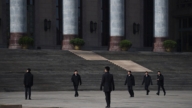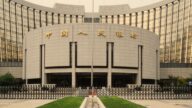【新唐人2011年10月13日讯】温州高利贷事件受到各方的关注,是否会引爆中小企业金融危机?专家剖析,这个现象暴露了温州复杂的高利借贷关系,与中小企业借钱不易的问题。专家认为,中共当局压制消息,中国目前正大量的发生着温州模式高利贷金融危机。请看本台记者的报导。
中国执行货币紧缩政策一年多来,存准率飙升到21.5%,民间借贷成了中小企业的资金供应链。《南方日报》报导,温州模式在中国大陆一直被当成民间金融的试验地区和榜样,规模庞大的民间借贷为温州中小企业提供了新的融资途径。不过今年以来已有90多个老板因资金周转困难,欠下巨额债务后“跑路”。
据大陆民间企业的一项调研——“小企业经营与融资困境调研报告”显示,温州地区有50%的小型企业是透过民间借贷完成融资,这些资金89%来自家庭或个人;59.67%来自企业参与的民间借贷市场。温州官方的文件也证实,温州当地民间借贷规模相当于温州全市银行贷款的1/5。
根据里昂证券的报告,温州民间未偿贷款总量可能高达人民币8000亿元到1万亿元,估计今年有10%到15%的未偿贷款将会变成坏账。不过,近几天,温州银监局官员否认了温州的民间信贷规模有里昂证券统计的那么大。
经济评论员杰森表示,温州这次资金链断裂,并不是温州一个地方的事,其他地方也陆续都有这样的事件出现。
杰森:“这个事在温州首先发生是因为这样搞得太凶,浙江这一带搞得最凶,整个民间贷款有时候利率可以到百分之一百多,但是呢,就是说其他地方呢,也都有像这样事情出现,比如说天津、比如说内蒙、比如说山西、比如说山东,1001表现上,就是说很多我们中小型的房地产企业,已经出现了落了油现象,就是说资金链已经够不上了,他就扔下跑了这样事情。”
杰森分析指出,中共一直将数据往下压,甚至动用官方媒体压制真相,他说,不要认为未来在中共媒体上看不到这些消息,中国就没有这些事情发生,其实很可能在暗处正大量的发生着。
大陆经济学家綦彦臣表示,银行将大部分的钱贷给了国企,最终导致民间高利贷盛行,以致民营中小企业受害。民营企业承担中国经济市场发展,提供政府税收以及农民工就业等,社会效益高,他认为,民营企业可以要求政府救助。
綦彦臣:“今天导致高利贷风险是国家金融垄断的恶果,他们有责任对自己政策错误进行反省,或者一种自我救赎这种方法。”
《21世纪经济报导》,内蒙古鄂尔多斯的高利贷市场紧急收缩,因担忧坏账风险,诸多放贷人却步。此外,深圳、广州等热点地区借贷机构都在近期放缓了放贷节奏,不过利率仍然维持高位。
新唐人记者梁欣、李庭、黎安安采访报导。
Usury Incident Reflects China’ Economy State
The recent Wenzhou usury incident unsettled many Chinese,
will this set off small and mid-sized firms’ financial crisis?
Experts analyze that this incident has exposed the complex
relationship of loan sharks and the problems of borrowing money.
They believe that the Chinese authorities are
hiding the true situation.
However, China is undergoing lots of Wenzhou-modelled
usurious crises.
Since last year, China started implementing the monetary
policy, and the bank deposit rate has risen up to 21.5%,
private lending has become a main supplier to small firms.
Nanfang Daily reported that the Wenzhou model was used
as a test and example. Large-scale private lending
provides a new source of funding.
However, over 90 bosses couldn’t repay the loans and fled.
According to a survey on mainland private firms, 50% of
small companies’ funds in Wenzhou are from private lending,
89% of these funds are from families or individuals. Ca. 60%
of the enterprises participate in the private lending market.
Wenzhou’s official document shows that private lending
accounts for 1/5 of the bank’s loan.
CLSA reported that the total private outstanding loans in
Wenzhou went from RMB800 billion to RMB1000 billion.
Analysts estimate that 10% to 15% of outstanding loans will
turn into bad debts this year.
Wenzhou banking officials denied these numbers, saying that
the scale of private loans is not as high as CLSA’s statistics.
Jason Ma, an economic commentator, said that what
happened in Wenzhou also happened in other cities.
Jason Ma: “It happened in Wenzhou first because they are
going to extremes. Zhejiang province is the worst,
the private lending rate rose over 100%, the same occurred in
many other places, such as in Tianjin, Mongolia
and Shangdong. Many of our small and mid-sized estate
companies cannot repay the loans, so they have to flee."
Jason Ma points out that the Chinese Communist Part (CCP)
hides the true figures of the loans from the public,
particularly using it’s mouthpiece media to cover up the truth.
Jason explained that if you don’t see CCP media reporting it,.
that doesn’t mean nothing is happening, on the
contrary, a lot of things are happening in the dark.
Mainland economist, Qi Yanchen, said banks lend money to
state-owned companies, resulting in prevalence of civil usury,
so that the small and mid-sized companies suffer.
The private enterprises take the leading role
in China’s economy market, creating jobs and revenue. Qi
believes private enterprises should require government help.
Qi Yanchen: “The state monopolized finance,
and is the leading cause of today’s usury financial crisis,
the government has the responsibility to correct its mistakes."
The 21st Century Business Herald reported that
Inner Mongolia Erdos is easing the usury market
due to the risks of incurring the bad debts.
Shenzhen, Guangzhou and other cities are also alerted
of the risks. However, the loan interests are still rising up.
NTD reporters Liang Xin, Li Ting and Li Anan.

























